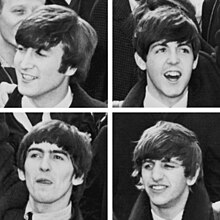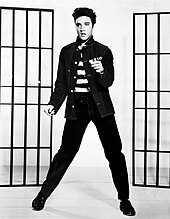List of NME number-one singles of the 1960s
 From Wikipedia - Reading time: 12 min
From Wikipedia - Reading time: 12 min
| UK singles chart number ones |
|---|
| UK singles chart |
| Other charts |
| Related |

The NME (or New Musical Express) was a British weekly popular music newspaper. Record charts in the United Kingdom began on 14 November 1952 when NME imitated an idea started in American Billboard magazine compiled their own hit parade. Until 15 February 1969, when the British Market Research Bureau (BMRB) chart was established, many periodicals compiled their own charts.[1] During this time the BBC used aggregated results of the prominent NME, Melody Maker, Disc, Record Mirror and, later, Record Retailer charts to compile their Pick of the Pops chart. Prior to 1969 there was no universally accepted source or "official" singles chart;[2][3][4] however, the Official Charts Company and Guinness' British Hit Singles & Albums regard the canonical sources for this period as NME before 10 March 1960 and Record Retailer from then until the BMRB took over in 1969.[5] Although Record Retailer is now the most predominantly used source for charting music in the 1960s, NME had the biggest circulation of charts in the decade and was more widely followed.[2][3] After the BMRB was formed, the NME continued compiling its own chart up until 14 May 1988.[1]
The Allisons' entry for the Eurovision Song Contest, entitled "Are You Sure?", was the first single to be number one on the NME chart but not to reach the top spot on Record Retailer's chart.[3] In total, sixteen songs failed to reach number one with Record Retailer but topped the NME chart.[3][6][7] In 1969, after the BMRB chart was introduced, four songs topped the NME but not the BMRB chart. Notable discrepancies include "19th Nervous Breakdown", which reached number one for the Rolling Stones on the NME, Disc, and Melody Maker charts, topped the BBC's Pick of the Pops aggregated chart and was announced as number one on Top of the Pops; however, because it did not reach number one on the Record Retailer chart, it is omitted from the Official Charts Company's canon.[2] The Beatles' "Please Please Me" suffered the same fate so, arguably, should be considered the Beatles' first number-one single.[3] Conversely, Elvis Presley's double A-side, "Rock-A-Hula Baby"/"Can't Help Falling in Love", reached number one on all charts except NME because the entries were split by NME according to which song was requested when the shop returned its figures.[2][3]
Number-one singles
[edit]




| Italics | Prior to 10 March 1960 the NME is considered by the Official Charts Company as the canonical source. |
|---|---|
| † | The song did not reach number one on the Record Retailer chart which is considered by the Official Charts Company as the canonical source until 15 February 1969. |
| ‡ | The song did not reach number one on the BMRB chart which is considered as the official chart after 15 February 1969. |
| [nb #] | The song spent a week at number one, where it shared the top spot with another song. |
| Contents |
|---|
| Contents |
|---|
Notes
[edit]- ^ a b c d The names, singles, week-ending dates and duration at number one are from NME.[1][8]
- ^ a b John Leyton's "Johnny Remember Me" and Helen Shapiro's "You Don't Know" were classified jointly as number one on 1 September 1961. The following week "Johnny Remember Me" reclaimed the number-one spot outright.[9]
- ^ a b Frankie Vaughan's "Tower of Strength" and Bobby Vee's "Take Good Care of My Baby" were classified jointly as number one on 1 December 1961. For the following three weeks "Tower of Strength" claimed the number-one spot outright.[10]
- ^ a b The Shadows's "Wonderful Land" and B. Bumble and the Stingers's "Nut Rocker" were classified jointly as number one on 12 May 1962. The following week neither reclaimed the number-one spot.[11]
- ^ a b Frank Ifield's "The Wayward Wind" and The Beatles' "Please Please Me" were classified jointly as number one on 23 February 1963. The following week The Beatles claimed the number-one spot outright.[12]
- ^ a b The Beatles' "From Me to You" and Billy J. Kramer & The Dakotas' "Do You Want to Know a Secret" were classified jointly as number one on 1 June 1963. The previous week "From Me to You" had been the number-one spot outright, and the following week "Do You Want to Know a Secret" claimed the number-one spot individually.[13]
- ^ a b The Yardbirds' "For Your Love" and Cliff Richard's "The Minute You're Gone" were classified jointly as number one on 10 April 1965. The next week neither song reclaimed the number-one spot.[14]
- ^ a b The Hollies' "I Can't Let Go" and The Walker Brothers' "The Sun Ain't Gonna Shine Anymore" were classified jointly as number one on 19 March 1966. The previous week The Hollies had been number one outright and The Walker Brothers held the number-one spot individually for the following three weeks.[15]
References
[edit]- Footnotes
- ^ a b c Smith, Alan. "Every No.1 in the 1960s is listed from all the nine different magazine charts!". Dave McAleer's website. Archived from the original on 10 May 2011. Retrieved 4 November 2010.
- ^ a b c d Smith, Alan. "50s & 60s UK Charts – The Truth!". Dave McAleer's website. Archived from the original on 3 September 2011. Retrieved 4 November 2010.
- ^ a b c d e f g Leigh, Spencer (20 February 1998). "Music: Charting the number ones that somehow got away". The Independent. Archived from the original on 1 February 2012. Retrieved 5 August 2010.
- ^ Warwick, Neil; Kutner, Jon; Brown, Tony (2004). The Complete Book Of The British Charts: Singles and Albums (3rd ed.). London: Omnibus Press. p. v. ISBN 1-84449-058-0.
Until 15th February 1969, there was no officially compiled chart.
- ^ "Key Dates in the History of the Official UK Charts". The Official Charts Company. Archived from the original on 10 January 2008. Retrieved 16 May 2010.
- ^ "Featured Artists: Elvis Presley". The Official Charts Company. Archived from the original on 26 September 2011. Retrieved 5 August 2010.
- ^ "Artist Chart History: Bobby Vee". The Official Charts Company. Archived from the original on 15 June 2011. Retrieved 5 August 2010.
- ^ Rees, Lazell & Osborne 1995, pp. 82–217.
- ^ Rees, Lazell & Osborne 1995, p. 104.
- ^ Rees, Lazell & Osborne 1995, pp. 107–108.
- ^ Rees, Lazell & Osborne 1995, p. 113.
- ^ Rees, Lazell & Osborne 1995, pp. 123–124.
- ^ Rees, Lazell & Osborne 1995, p. 127.
- ^ Rees, Lazell & Osborne 1995, p. 152.
- ^ Rees, Lazell & Osborne 1995, p. 165–166.
- Sources
Rees, Dafydd; Lazell, Barry; Osborne, Roger (1995). Forty Years of "NME" Charts (2nd ed.). Pan Macmillan. ISBN 0-7522-0829-2.
 KSF
KSF